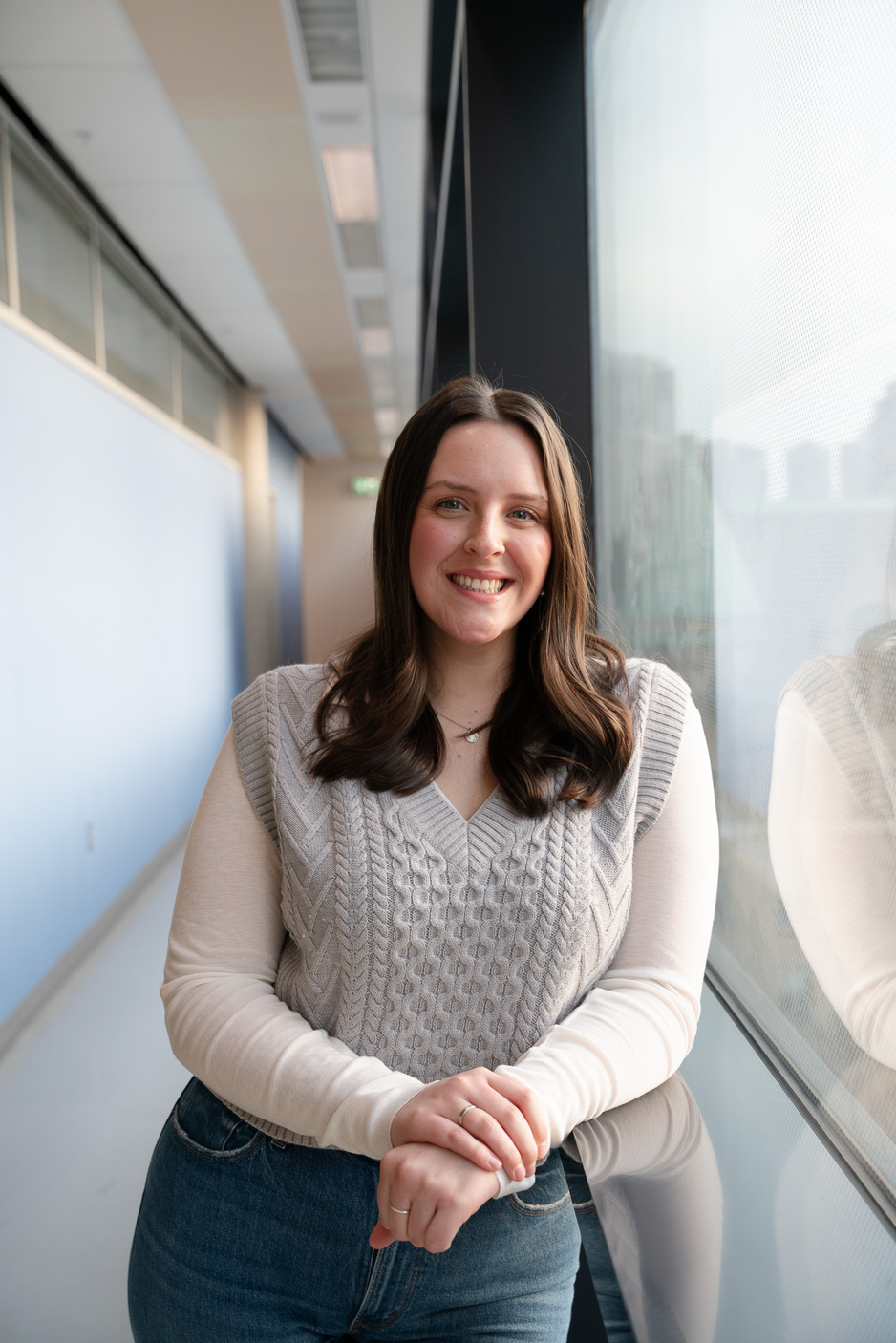Third Year PharmD student Cloé Lafleur conducts medication management consultation with patient actor Brandon Oakes
Second-year pharmacy students practice incorporating knowledge of Indigenous health, ceremonies and traditional medicines
When Cloé Lafleur was in her second year of the Doctor of Pharmacy (PharmD) program at the Leslie Dan Faculty of Pharmacy last year, she, along with her classmates, took part in the first-ever medication therapy management (MTM) lab solely focused on counselling Indigenous patients. The lab, organized by Assistant Professor Jaris Swidrovich, engaged Indigenous standardized patients (SPs) to provide students with practical experience learning about and applying knowledge of Indigenous health, ceremonies and traditional medicines.
Lafleur valued the experience of gaining more exposure to Indigenous knowledge systems and practice incorporating this knowledge into patient care. She saw the same appreciation in her classmates.
“The response from my cohort was so overwhelmingly positive."
“The response from my cohort was so overwhelmingly positive. Even this small bit of exposure from one lecture and lab made people so much more aware of Indigenous health, and it allowed us to have so many more productive conversations, even in casual settings,” says Lafleur. “I saw the ripple effect that it had on students and how they wanted to branch out a bit more and learn more about it.”
So when Lafleur heard that Swidrovich, also the Indigenous Engagement Lead at the Leslie Dan Faculty of Pharmacy, was running the lab again this year, she immediately asked them how she could be involved. She helped train the SPs in their different scenarios and ensured this year’s lab, which took place in early February, went smoothly.
“We’re so grateful for the First Nations, Inuit and Métis standardized patients because we couldn't run this lab without them,” says Lafleur. “They offered up their time and lived experiences with the health care system to help make us better practitioners.”
Lab scenarios included issues specific to Indigenous Peoples
The Indigenous MTM lab was developed in part to respond to several of the Truth and Reconciliation Commission of Canada’s calls to action to address the ongoing impacts of residential schools and advance reconciliation with Indigenous Peoples, specifically the call to action to develop skills-based training in intercultural competency for students in health care fields.
Prior to the lab, Swidrovich gave a lecture that provided students with sufficient information to effectively and respectfully work through cases with Indigenous patients. Then students practised applying their knowledge with Indigenous SPs who were scripted to ask the students about issues highly specific to Indigenous Peoples centred around a common health condition, high blood pressure.
For example, one scenario involved an SP asking whether they could attend a sweat (also known as a sweat lodge) while taking blood pressure medication, while in another scenario, the SP asked about potential interactions between their prescription medication and an Indigenous traditional medicine.
Swidrovich says the lab is not about ensuring that students know everything about Indigenous health and cultures, but rather that they learn to navigate different knowledge systems and respectfully communicate with their Indigenous patients.
“We want to give them some strategies to navigate those intercultural conversations without talking down about a particular knowledge system, ensuring that they build trust with their Indigenous patient and providing a safe environment,” says Swidrovich.
“There's no secret right answer. But it’s important to be able to have a good, respectful conversation that recognizes the importance of Indigenous knowledge systems, traditions and ceremonies to have a positive therapeutic relationship.”
Respectful conversations key to building positive relationships
Swidrovich says the lab was an overwhelmingly positive experience for everyone who participated. Students said they felt more confident in their knowledge and skills, the SPs said they felt the students created a respectful, safe environment, and some of the SPs even said that they learned and appreciated more about pharmacy practice. Swidrovich is now working with other pharmacy programs across the country to develop their own Indigenous-focused labs.
Lafleur says that she hopes that the students who participated in the lab this year will – like her cohort – continue learning about how they can improve the care that they provide to their Indigenous patients.
“Even if something is not your area of expertise, the more you have conversations about it, the more you're able to respond appropriately,” she says. “When you're interacting with patients who might have different views on medicine than you do, you can still have a respectful and positive interaction, and that patient is more likely to feel comfortable coming back to you in the future.”
The Indigenous MTM lab was a partnership between the Leslie Dan Faculty of Pharmacy and the Indigenous Pharmacy Professionals of Canada.
More News
Image

Dean Lisa Dolovich reappointed for second term
Professor Lisa Dolovich has been reappointed for a second term as Dean of the Leslie Dan Faculty of Pharmacy, University of Toronto, effective July 1, 2025, to December 30, 2030.
Read More
Image

Pharmacy Summer Camp gives high school students insight into pharmacy profession
A new summer camp based at the faculty will give high school students a range of experiences in pharmacy and pharmaceutical sciences.
Read More
Image

Team GloveLift wins 2025 Business Plan Competition with innovative medical device
PharmD students win $5,000 prize for their innovative medical device concept aimed at improving patient care.
Read More

